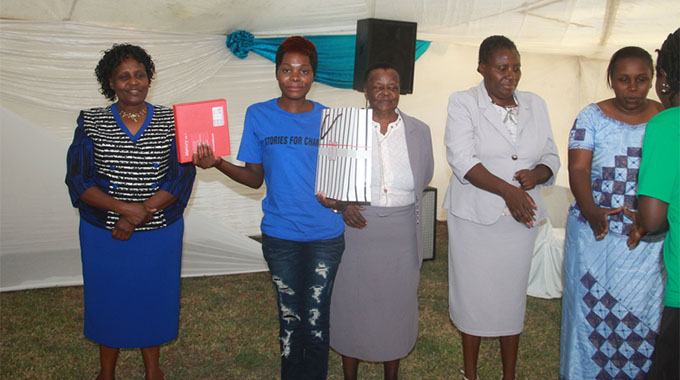Digital storytelling in the fight against child marriages

Rumbidzai Ngwenya Features Reporter
Forty-eight-year -old Madzibaba Kwangwari of Siyakureva village in Ward 19, Jerera, Zaka district, is a proud member of the Johanne Masowe apostolic church. He lives with his four wives who are aged 28, 22, 16 and 14. When he first got married he was 28 and his first wife was only 14. He went on to marry two more wives aged 12 and 11 respectively.
They are growing into adulthood as Madzibaba Kwangwari’s wives.
He loves his big family. He cannot do without them. They are his “manpower”.
“Since I’m not gainfully employed, my wives are my company,” he said.
“I work in the fields, so the more wives and children I have, the more labour I have.
“If I abandon my religion for any reason, it means I will have less labour for my field.”
Marrying younger girls, he says, is what the spirit of the Lord tells members of the church to do.
As the church requires, he looks forward to marrying off his own children to older man.
“There is a better chance of a stable marriage if our children marry older men who have cattle and wealth,” he said.
“Children cannot marry each other. They must be married off to older men who are capable of working and taking care of many wives.”
Even the wives seemed not to have any qualms about their lifestyle despite the fact that, as big as the family is, they live in one room.
“We were born and raised in this church,” said one of Kwangwari’s wives.
“We do not have a problemwit with that because we have grown up under such circumstances. Actually we are happy sharing our man.” Members of this church believe in prophetic healing and do not seek medical help.
The wives have had children at a very tender age, being exposed to all the risks associated with young motherhood. One of the wives has already lost three children since the religion does not allow them to go to hospital.
The wives also don’t use any family planning methods, so chances of having many children are very high.
Even if a chance of going back to school was to arise, the wives were apparently not uninterested.
For them, in marriage, they have reached a milestone.
“Go back to school? Leaving our husband? No! We will not,” they openly refused.
A video of their conversation went viral on social media recently sparking a heated debate around child marriages and women’s rights. Most people were angered by Madzibaba Kangwari’s actions.
Madzibaba Kangwari is not the only one. This case plays out in many parts of the country.
The video was titled “Religion as Driver of Child Marriages”.
It was shot by Zaka storytellers in a programme coordinated by Grassroots Women Network (GWN) and won the best story prize at the graduation and awards ceremony held in Harare recently.
The programme by GWN aims to tackle development problems in innovative ways.
GWN, in partnership with the Women’s Coalition of Zimbabwe, have over the past year implemented a digital storytelling project which targeted 30 young rural women from Seke, Zaka and Gokwe.
The goal of the project was to make women’s voices heard on issues that affected them, especially the girl child, and possibly trigger solutions.
The young women received training on digital literacy, storytelling, cutting, editing and publishing stories on social media platforms, a skill which they used to document women’s issues in their respective districts.
As the video reveals, religion – among other drivers – continues to violate girl children’s rights across the country by pushing them into early marriage.
Young girls as young as 11 are manipulated into marriage and deprived of their right to education and freedom of choice among other things.
According to the World Health Organisation, one in three girls are married before the age of 18.
Child marriages remain a major cause for concern especially in rural Zimbabwe.
Despite the High Court ruling of January 2016, which outlawed child marriages in Zimbabwe, the practice keeps resurfacing and being practised especially among communities in which religion holds sway.
Women’s problems such as health, education, domestic life and human rights violation exist in every corner of the world but hardly get much attention.
Most cases go unreported as it has become the norm in many societies and religions.
It is such issues and concerns facing modern women that GWN sought to address in the programme. The stories were better told by women who faced the challenges.
The best storyteller for Zaka district was Ratidzoyashe Matembudze while Mavis Funani shone for Seke district .
The two won digital gadgets and accessories as prizes.
Other issues that were raised were domestic unpaid work that was hindering women from participating in other development projects and unavailability of health facilities to women and girls living with disability.
“Women’s rights violation is a worldwide phenomenon and it is good that programmes like these seek to address such issues at national level,” said gender commissioner Sheila Matindike.
“We need to work together as a country to ensure that women are recognised and, most importantly, to shun child marriages.”
She encouraged storytellers to use the knowledge and skills acquired during the GWN programme as building blocks in life.
“Storytellers must strive for greater success and never look down upon yourselves,” Matindike said.
“As women we need to be the first whistleblowers on issues that are affecting us.’
GWN is a coalition of three membership-based local non-governmental organisations that work in the area of socio-economic empowerment of women.
It strives to improve women’s lives and eradicate any form of human rights violations.
Women still continue to face numerous challenges and storytelling is one way of fighting abuse and exploitation.










Comments